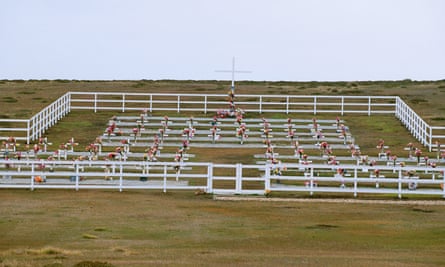Argentina’s vice-president has lambasted a new UK-Argentina Falkland Islands agreement, saying her nation had been offered “crumbs”.
The pact, announced last week, includes resuming flights to the islands, restarting negotiations on a humanitarian project plan, and organising a trip for relatives of fallen soldiers of the Falklands war to visit their graves.
Argentina’s foreign minister, Diana Mondino, and her British counterpart, David Lammy, reached the agreement on the sidelines of the United Nations general assembly, with both foreign offices saying the measures would “improve the bilateral relationship”.
Once a month, flights to the islands from São Paulo in Brazil will stop in Córdoba, Argentina, while both countries have also agreed to cooperate on the conservation of fisheries.
But the vice-president, Victoria Villarruel, hit out at the plans over the weekend, saying they were “contrary to the interests of our nation”.
“Do they take us for fools? They are getting material, concrete and immediate benefits, while they are offering us crumbs as emotional consolation and weakening our ability to negotiate,” said Villarruel, a fiercely conservative politician who comes from a military family.
The Falklands, known in Argentina as the Malvinas, lie 300 miles east of the South American country’s coast. Sovereignty over the islands has been disputed since colonial times. Argentina has claimed sovereignty since the early 19th century, but Britain, which has also claimed sovereignty, seized the territory in 1833, expelling the few remaining Argentinian occupants. A 74-day war between the two countries in 1982 ended with Argentina’s surrender, and the loss of 649 members of the Argentinian military, 255 British service personnel, and three islanders.

In a 2013 referendum, 99.8% of residents voted for the islands to remain a British territory. Nonetheless, sovereignty remains a fraught topic across Argentina; all public transport units must display signs reading “The Malvinas are Argentinian”, while the dispute is used frequently during political campaigning.
It is not the first time Villarruel – who was crucial in building the voter base that led to Javier Milei’s surprising electoral success last year – has broken ranks with the president. Other disagreements have seen the pair clash over pay rises and even a football chant.
Dr Julio Montero, an associate professor in political theory at the University of San Andrés, said the dispute “speaks to the ideological tensions” within Javier Milei’s recently formed La Libertad Avanza party. “Milei is meant to be a libertarian. Villarreal is a conservative nationalist with ties with the military,” he said.
Jack Ford, the chair of the Falkland Islands legislative assembly, said that “all parties stand to gain from this cooperation”, which he said would provide substantial economic benefits, along with closure for the families who lost loved ones in the war.
Source: theguardian.com

















